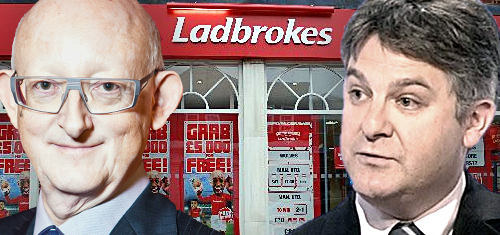 A Tory MP with a history of supporting gambling interests has hit back against claims that he received favorable treatment from bookmakers Ladbrokes.
A Tory MP with a history of supporting gambling interests has hit back against claims that he received favorable treatment from bookmakers Ladbrokes.
Over the weekend, The Times newspaper reported that MP Philip Davies (pictured far right) – who worked as a bookmaker before being elected to Parliament in 2005 representing Shipley in West Yorkshire – received “extremely favorable” treatment from Ladbrokes regarding his personal betting account.
Specifically, The Times claims Ladbrokes imposed restrictions on Davies’ account way back in 2006 after the bookie determined Davies was employing a ‘bad each way’ strategy by backing second- and third-place nags in horseracing events. A source told The Times that Davies was likely netting something in the “low thousands of pounds” per year in order to have triggered the restrictions.
Davies reportedly contacted a Ladbrokes director to complain about the restrictions, which The Times claimed were subsequently lifted. Racing UK pundit Dave Nevison told The Times that the lifting of such restrictions represented “extremely favorable treatment” of a winning punter by a bookmaker.
The Times reminded its readers that parliamentary watchdogs had chided Davis three years ago for failing to declare hospitality shown to him by Ladbrokes. The paper, which recently joined the media chorus demonizing the fixed-odds betting terminals (FOBT) in high street betting shops, also cited Davies’ past support for bookmakers adding more FOBT.
In response, Davies told The Times he wasn’t aware that he’d received any special treatment and claimed to be equally unaware that holding a seat in Parliament meant “you weren’t allowed to complain when you are a customer and you receive poor service.” Davies rejected the preferential treatment allegation as “a total non-story.”
Davies said that his views (and votes) on gambling issues “are long-standing and consistent” but he rebuked The Times for spending so much time rehashing his bookmaking roots, calling it “a personal slur playing the man rather than the ball.”
A Ladbrokes spokesman said any suggestion that it had changed its terms of service based on Davies’ complaints was “wholly misleading and utterly absurd.” Ladbrokes said it imposed or lifted account restrictions “principally on the evidence of betting activity and patterns.”
THE CLAWS COME OUT IN CFG v. DAVIES 2
Longtime anti-FOBT activists at the Campaign For Fairer Gambling (CFG) have jumped on The Times story, vowing to file a formal complaint with the parliamentary commissioner regarding Davies’ betting behavior.
The CFG claimed that Davies “enjoys a similar account” with bookmaker William Hill and called on Davies to make public all his betting records along with proof that the MP paid tax on all proceeds from his wagering activity.
While acknowledging that there was no “documentary evidence” to prove Davies received favorable treatment by either bookmaker, the CFG claimed that it was “clearly and convincingly above the balance of probability that there is an organized, financially beneficial relationship between Mr. Davies and the bookmakers.”
CFG founder Derek Webb (pictured on the left) claimed Davies’ response to The Times “does not address the substance of the complaint” and Webb suggested Davies’ represented “only the most blatant example of politicians who enjoy bookmaker hospitality at racing and sporting events, often below the reporting threshold.”
Davies said he would welcome a public inquiry into his betting activity “so that everyone can see this complaint treated with the contempt it deserves.” Davies noted that Webb donated £25k to the Shipley Labour Party prior to the last general election, a fact Davies believes illustrates that “Mr. Webb and his henchmen appear to be motivated by sheer vindictiveness to those who stand in his way.”
Davies and Webb squared off a couple years ago after Davies called bullshit on claims made in an anti-FOBT advert the CFG ran in parliamentary magazine The House. The Advertising Standards Authority gave Davies the decision on points, leading Webb to protest that Davies’ complaint “should have been confidential” but details had been made public before the authorities could make a proper determination. (Insert your chosen verse of Alanis Morissette’s Ironic here.)






